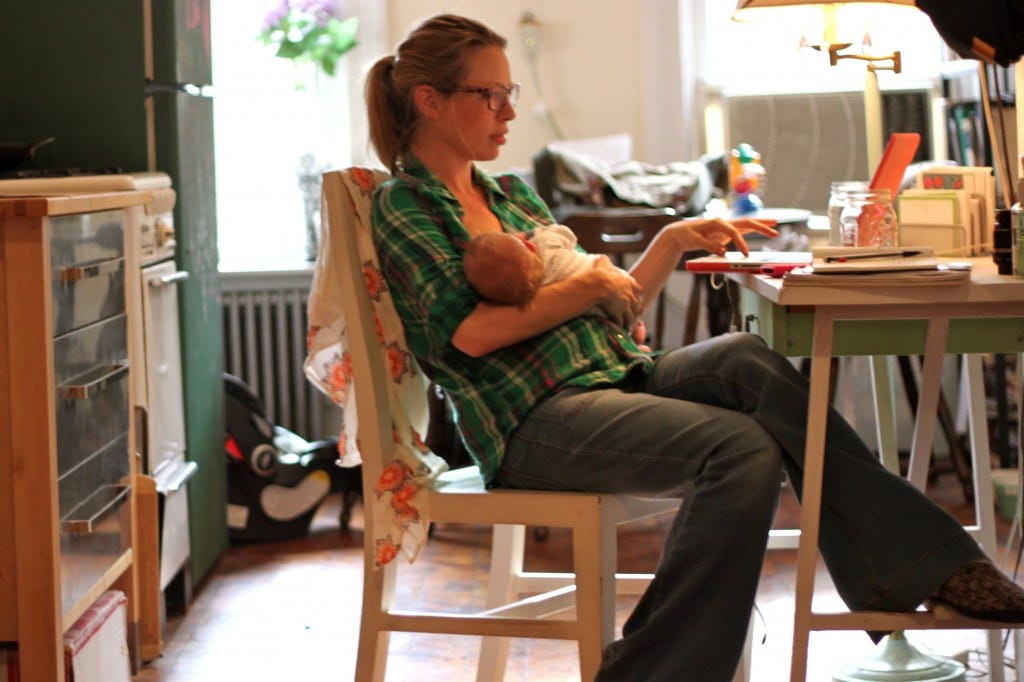Ramshackle Glam is a website about parenting, divorce, anxiety, and other funny stuff. This post is free, but if you want to upgrade you’ll automatically receive an eBook that I wrote just for paid subscribers. I’m pretty psyched about it :) And remember, if you become a Founding Member you also get a one-on-one consult with me about writing for a living, personal branding, or *literally* whatever’s on your mind.
A couple of fun recent posts you may have missed:
However Bad You Might Imagine Getting Children’s Passports Might Be…It Is Worse Than That
My Glamorous Morning (In Which I Insert the Top Half Of My Body Into A Dumpster)
And now…today’s post.
OH. KAY. Sit down, because I am mad this morning.
My tendency, when going about my daily internet-travels, is to be positive whenever possible. I don’t post bitchy comments, or take time out of my day to shame people (this being one notable — and, I think, very understandable — exception).
But I read a post by Dahvi Shira the other day, presumably an “opinion piece” on the recent story of an influencer whose three-year-old son tragically died in a pool accident, and it made me livid. I found myself trying to parse exactly why her article struck such a dissonant chord for me — and, clearly, for many others, if you check out the comments. As someone who has lived at the strange intersection of internet culture and motherhood for well over a decade, I thought, you know what?
LFG.
Let’s start here: The death of a child is an unfathomable tragedy. I don’t have the words to describe it, and for that I am grateful. But certainly, none of us are entitled to use the miseries afflicting a fellow human as an illustrative point in a broader argument about the ills of — of all things — influencer culture. …Right? Isn’t this just…obvious?
Except that’s exactly what Shira’s piece attempts to do: Wrap a fresh and devastating personal tragedy (and yes, even if you post about your family on the internet, you do get to have personal tragedies) into a cruel and cynical package in which she says things like this:
If all these SAHMs, as they call themselves (stay-at-home-moms) can make money by popping out kids and being on their phone all day, they’re not going anywhere.
“SAHMS, as they call themselves.”
“Make money by popping out kids and being on their phone all day.”
Stay with those sentences for a moment. The disdain — from a woman, towards other women — is palpable.
Having been on the receiving end of these kinds of “takes” on influencer culture c/o GOMI (whose author, Alice Walker Wright, frequently and charmingly described my own children as having been “shit out for content”), I recognize the author’s not-so-hidden slights and not-so-carefully-worded judgments in my bones.
I know what it feels like to be on the receiving end of public judgment masquerading as moral high ground, which is why I recognize what Shira is doing so clearly: The rush to turn personal pain into content, the thinly-veiled judgments dressed up as “concern.” It’s a trick as old as the internet itself, and it always feels the same:
Absolutely, utterly, completely gross.
First, the piece presents a glaring false equivalence. As commenter Sarah pointed out, it is one thing to critique parents who turn their children’s lives into revenue streams by design — Ryan’s World comes to mind as an example that I find personally disturbing, and I do agree that the monetization of content involving children is ethically murky and deserves careful consideration from those who participate even tangentially (as I do). But it is another thing entirely to suggest that the simple fact of being a family blogger is enough to subject you to this level of scrutiny during a time of unthinkable loss.
JFC, this article is not analysis; it is cynicism and judgment dressed up as concern.
But even more important, I think, is the context missing from Shira’s argument. Let me explain.
Here is a photograph of me two weeks after giving birth to my first child. In this photo, I am blogging while simultaneously breastfeeding. I remember being terrified to share this shot — even though I thought it was an important one — because I so feared the judgment (which I did, of course, receive): What kind of a mother are you? Why aren’t you focusing exclusively on your child?
…Why?
Because this career I’d found myself in wasn’t just an opportunity…it was a lifeline, both for myself and for my child. And I was willing to do whatever it took to preserve it.
See, when I started blogging, it wasn’t an especially good way to make a living — although it quickly became so, as myself and a cohort of other women (and they *were* all women) began to craft a career path that hadn’t previously existed. This career eventually allowed me to parent full-time while also making enough money to take care of my family while my husband went back to school. And although I loved — loved — my work, trust: It was not a walk in the park. There was no “sleeping when the baby sleeps.” I ran on pure terror-fueled adrenaline for a solid eight or so years.
But having been there from the very start of this industry, let me tell you: I have been utterly astounded by the work ethic, innovation, and dedication of women who looked at a situation that seemed impossible — having children and actually raising them while simultaneously making a living — and magicked a solution out of thin air.
There are deeply entrenched, systemic forces at play here, ones that make online work not a “luxury” or “indulgence” for many mothers, but an actual godsend. In a country where affordable childcare is a pipe dream and significant paid parental leave a fantasy, women — mothers, especially — have been forced to find innovative ways to support their families. And if those ways happen to fulfill them creatively and emotionally at the same time? Isn’t that…kind of incredible?
Of course I understand that writing about one’s life may seem indulgent. It may provoke jealousy (why does *she* get to do that?) that ends up getting expressed as disdain. I also, of course, understand the legitimate issues when it comes to sharing about children online — how much is “too much”, where do you draw the line, et cetera. We absolutely can (and should!) have complex and ongoing conversations about privacy and boundaries, but it is absurd to pretend that mothers who write about their lives for a living are making these choices in a vacuum, solely for the benefit of their wallets and egos.
To the contrary: They are often making choices in a context where the alternative is…well…what? Paying the equivalent of your salary for childcare, just for the “benefit” of getting to see your child as little as possible? Staying at home with your children — perhaps missing out on work that would be meaningful to you — and relying solely on a partner for income? Need I remind you of the divorce rate in this country? (It’s 40-50%.)
Which brings me to the question posed by Shira (in response to a comment I wrote) that led me to write this post:
so you then decide to have kids because you can't afford them? and therefore make content solely driven from their presence? make it make sense.
Oh, girl. You said in your piece that you are not a parent — which, if that’s what you want, good for you! Personal choices, et cetera. But let me draw your attention to a point that may have escaped you:
Motherhood is not only for the wealthy.
The suggestion that it’s irresponsible to have children that you “can’t afford” isn’t just insulting — it’s dangerously classist. The idea that only people with disposable income to spare are entitled to experience parenthood echoes some of the ugliest strains of historical gatekeeping. Are we really suggesting that the only people allowed to have children are those who can independently bankroll their lives (or have said lives be bankrolled for them) without having to work? God forbid women who want to have children search for innovative ways to earn money while actually raising their own babies.
Online sharing exists along a spectrum, yes. Exploitation of children is 100% a topic deserving of attention. But the notion that sharing parts of ones’s family life online constitutes “making content solely driven by their presence” is a gross mischaracterization. For many parents, content creation is about connection, survival, and often financial necessity. For me, it was all of those things. And that does not invalidate my work. To imply otherwise is not only a misreading of how labor works in the digital age; it’s a dehumanization of the very real struggles modern families face.
Here’s the thing: You cannot claim to care about protecting children while simultaneously weaponizing a child’s death against a grieving parent. You cannot pretend to critique systemic issues while targeting an individual — an actual, real life person — who is already living through the worst experience imaginable. If we want to have a conversation about the ethics of family vlogging, let’s do it — but not by piggybacking off of someone’s fresh grief.
If your first instinct in the face of a mother’s worst nightmare is to criticize her life choices for not aligning with your privilege…well, perhaps it isn’t only the influencers who are in need of some self-reflection.







👏👏👏👏👏👏👏